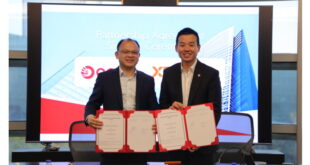SINGAPORE –
Media OutReach Newswire – 16 April 2024 – Professor Gertjan Medema, 62 years old, has been awarded the prestigious Lee Kuan Yew Water Prize 2024 for his breakthrough research and discovery, and significant contributions in the field of wastewater-based epidemiology (WBE). His research revolutionised the application of WBE for virus detection in wastewater during the COVID-19 pandemic.
(From Left) Mr Ong Tze-Ch’in, Chief Executive, PUB, Singapore’s National Water Agency congratulated the Lee Kuan Yew Water Prize 2024 Laureate, Professor Gertjan Medema, Principal Microbiologist of the KWR Water Research Institute.

2
“It is my great honour and privilege to receive the distinguished Lee Kuan Yew Water Prize. This award is a recognition of the innovative use of wastewater as a data source for trends in COVID-19 circulation in our communities. I see it also as a recognition of the hard work of many people in the water sector globally, collecting COVID-19 data from wastewater to support our society’s response to the pandemic. This tightens the connections between the water and health sectors. In the current post-pandemic world, wastewater monitoring is now firmly established as a tool for public health surveillance for an increasing number of diseases,” said Professor Medema, Principal Microbiologist at the KWR Water Research Institute, and the 10th recipient of the award since 2008.
Professor Medema’s contributions during the Covid-19 pandemic
3
With the emergence of COVID-19 in early 2020, Professor Gertjan Medema, a renowned microbiologist and an expert in water quality and health, and his team, recognised the need for early detection and monitoring, and began collecting wastewater samples across the Netherlands to test for the SARS-CoV-2 virus. He quickly focused his team’s research on curbing the spread of the virus in the community through wastewater surveillance. The results were promising when evidence of the virus was detected in the wastewater of several cities even before they were officially reported in these cities.
4
Professor Medema’s work has been foundational in establishing WBE as a tool for public health surveillance during the pandemic. The impact of his work was evident from his first publication in this area which garnered substantial attention with over 1,400 citations and more than 34,000 views between 2020 and 2023. Wastewater surveillance has since been adopted worldwide as a powerful tool for the early detection of diseases like SARS-CoV-2, even before cases are reported through clinical testing. This in turn provides valuable insights into the prevalence of the virus in a community, and a proven cost-effective and non-invasive method for tracking the spread of the disease.
Wastewater surveillance in Singapore
5
At the start of the COVID-19 pandemic in Singapore in 2020, NEA’s Environmental Health Institute (EHI), in collaboration with PUB, Singapore’s national water agency, the Home Team Science and Technology Agency (HTX), and other partners from local universities[1] and research institutes[2] explored wastewater monitoring as an epidemiological tool and early warning system for outbreaks. Through partnerships with relevant institutions[3], innovative solutions in wastewater surveillance were quickly developed to respond to the national need. Singapore bolstered its national surveillance efforts for COVID-19 transmission by expanding coverage to hundreds of sites, including water reclamation plants, workers’ dormitories, residential areas, town centres, student hostels, and welfare homes. Today, the wastewater sampling network covers more than 500 sites across Singapore. Apart from situational monitoring of COVID-19, wastewater surveillance has also been applied to monitor Zika transmission in Singapore. NEA and the network of partners will continue to conduct research and development to build on the wastewater testing system, to support public health in Singapore.
Significant impact to global scientific community
6
Wastewater has been tested for SARS-CoV-2 in at least 72 countries at over 4000 reported sites[4], with Professor Medema himself connected to about 30% of these programmes directly. Amidst his active involvement in international collaborations, and sharing of expertise and findings with the global scientific community, he has made great contributions to the development of international guidelines and best practices for wastewater surveillance.
7
Dedicated to advancing the science of waterborne pathogens, Professor Medema advises the World Health Organization (WHO) on microbiological drinking water guidelines and Quantitative Microbial Risk Assessment (QMRA); SARS, Water, Sanitation & Hygiene (WASH); and wastewater surveillance. He also advises the European Commission on the EU Drinking Water Directives and water reuse guidelines, thereby ensuring that the knowledge gained from his research is disseminated widely and applied effectively. His leadership in this area has helped to establish a network of researchers and practitioners dedicated to using WBE as a tool for public health surveillance. As the world braces itself for other emerging diseases, wastewater surveillance has been established as a vital tool in safeguarding public health through Professor Medema.
8
Professor Medema will receive the Prize – an award certificate, a gold medallion and a cash prize of S$300,000 sponsored by the Temasek Foundation, from Mr. Tharman Shanmugaratnam, President of the Republic of Singapore, at an award ceremony on Tuesday, 18 June 2024. He will deliver a keynote lecture on Wednesday, 19 June 2024, during the Singapore International Water Week 2024, which is expected to be attended by 500 global water leaders, 2,000 delegates, and more than 30,000 trade visitors.
![]() https://www.siww.com.sg/
https://www.siww.com.sg/![]() https://linkedin.com/company/siww
https://linkedin.com/company/siww![]() https://twitter.com/WaterWeekSG
https://twitter.com/WaterWeekSG![]() https://www.facebook.com/siww.com.sg
https://www.facebook.com/siww.com.sg
Hashtag: #SingaporeInternationalWaterWeek #SIWW #LeeKuanYewWaterPrize2024
The issuer is solely responsible for the content of this announcement.
 Odisha Samachar Odisha Breaking News , Odisha Current News , Odisha News
Odisha Samachar Odisha Breaking News , Odisha Current News , Odisha News




